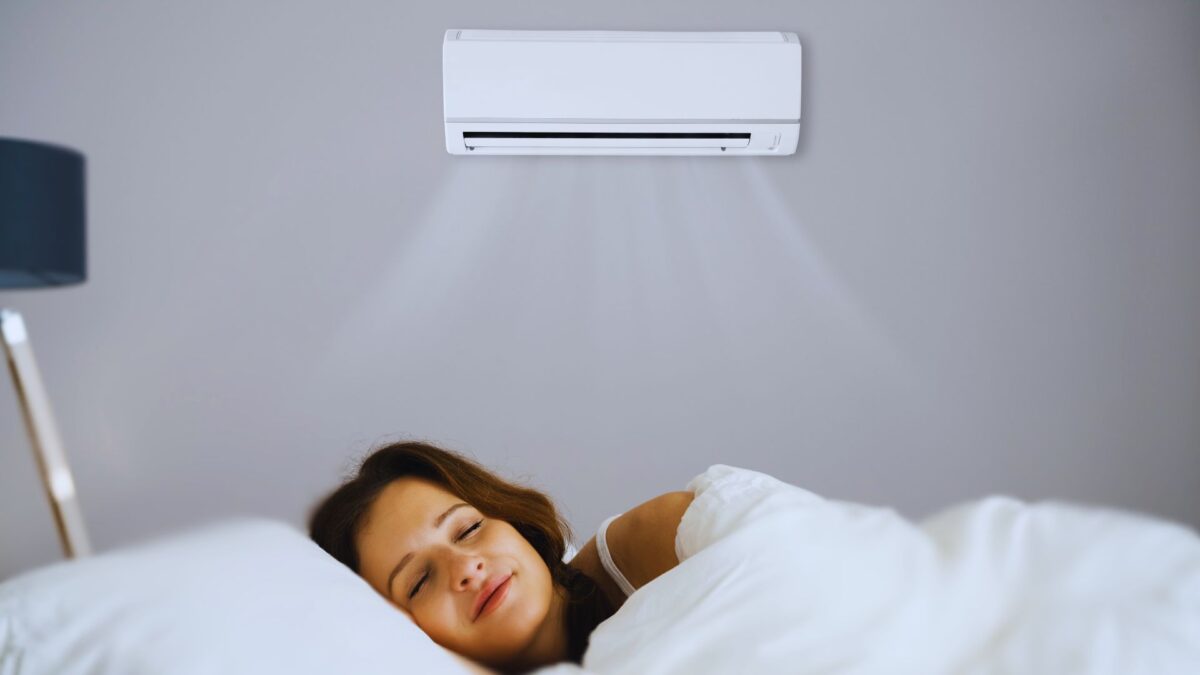The Impact of HVAC Systems on Sleep Quality: Tips for a Restful Night’s Sleep

Getting a good night’s rest is essential for overall health and well-being; this is where HVAC and sleep quality can significantly impact how well you recharge. Temperature, humidity, air quality, and noise levels all influence how well you get rest each night, and optimizing your HVAC settings can lead to better respite, increased energy levels, and a more comfortable home. Here’s how your climate control system affects restfulness and some simple tips to set the scene for an ideal bedtime environment.
The Ideal Bedtime Temperature
Heat works against your body when supporting a good night’s rest, and your circadian rhythm naturally lowers your core body temperature. In fact, your circadian rhythm, more commonly known as your body clock, lowers body temperature by 2 degrees as you doze. This may seem insignificant, but as you cool down, your brain releases melatonin – the key hormone in promoting sleep.
Adjusting Your Indoor Temperature for Sleep
Paying attention to the thermostat is essential as you get ready to crawl into bed. So, what is the best temperature for sound sleep? According to The National Sleep Foundation, you should keep temperatures between 60-67°F. When the temperature is too warm, your body must work harder to cool down, leading to restlessness. Consider using a programmable or smart thermostat to automatically lower the temperature shortly before going to bed and adjust it in the morning for comfort. Of course, there are still those who prefer warmer temperatures while snoozing. In this case, use lightweight bedding instead of keeping the thermostat at a higher temperature.
Controlling Humidity for Better Sleep
It’s not only the temperature of the environment that affects slumber. Humidity also plays a significant role in sleep comfort. In a room that is too humid, you may experience night sweats and discomfort, and you may also find that you have throat irritation and dry skin if the air is too warm. It’s critical to pay attention to humidity levels to keep yourself comfortable and ensure optimal rest.
Ideal Humidity Levels for Bedtime:
A 30-50% relative humidity level is recommended for optimal comfort.
HVAC Tip:
In humid climates like Florida, using a dehumidifier to remove excess moisture in the air and prevent overheating is a good idea. By contrast, a humidifier will add moisture to dry air, promoting better breathing and skin hydration. You’ll be much more comfortable when it comes time to drift off to sleep.
Air Quality and Sleep Health
Poor air quality negatively affects how well you sleep. High pollution and carbon dioxide levels can reduce efficiency and increase the risk of sleep apnea, disrupting sleep cycles and causing daytime drowsiness.
How to Improve Air Quality for Better Slumber:
There are essential steps to take to improve air quality and promote better sleep. Here’s how:
- Replace HVAC filters every 1-3 months to trap allergens and dust.
- Install an air purification system to remove pollutants.
- Keep your ducts clean to prevent allergens from circulating throughout your home.
HVAC Tip:
- Use high-efficiency filters (MERV 8-13) to capture fine particles that impact air quality.
- Vacuum regularly and wash the bedding often to keep bedrooms dust and allergen-free.
Lower Climate Control System Noise for Uninterrupted Rest
Nothing disrupts HVAC and sleep quality like a noisy system. To reduce the sound, insulate the ductwork with sound-dampening materials, cover vents with soundproof covers, and address any loose components in the system.
HVAC Tip:
- Excessive noise may indicate that the system needs repairs.
- Modern, energy-efficient systems are quieter, so consider upgrading.
- White noise machines can help mask minor operational sounds.
Innovative HVAC Technology for Better Sleep
Smart home technology enhances HVAC and sleep quality. It enables precise control of your bedroom temperature with a programmable thermostat, creating an ideal environment for rest.
How Smart HVAC Technology Helps:
- Schedule cooling before bedtime and maintain that temperature throughout the night, using motion sensors to adjust airflow based on activity levels.
- You can even use your phone or voice assistant to control the temperature.
HVAC Tip:
- Consider investing in a smart thermostat to create the perfect customized sleep setting that adjusts temperatures overnight.
Optimize Your HVAC and Sleep Quality
HVAC and sleep quality are closely linked, as your heating and cooling system plays a crucial role in ensuring a restful night. Maintaining the right temperature, humidity, air quality, and noise levels creates the perfect bedtime environment. You’ll enjoy a more profound, uninterrupted rest and feel fabulous.
Ready to improve your slumber with an optimized HVAC system? Contact Aztil Air today for tune-ups, air quality solutions, and smart thermostat installations to help you get the best night’s rest possible!












